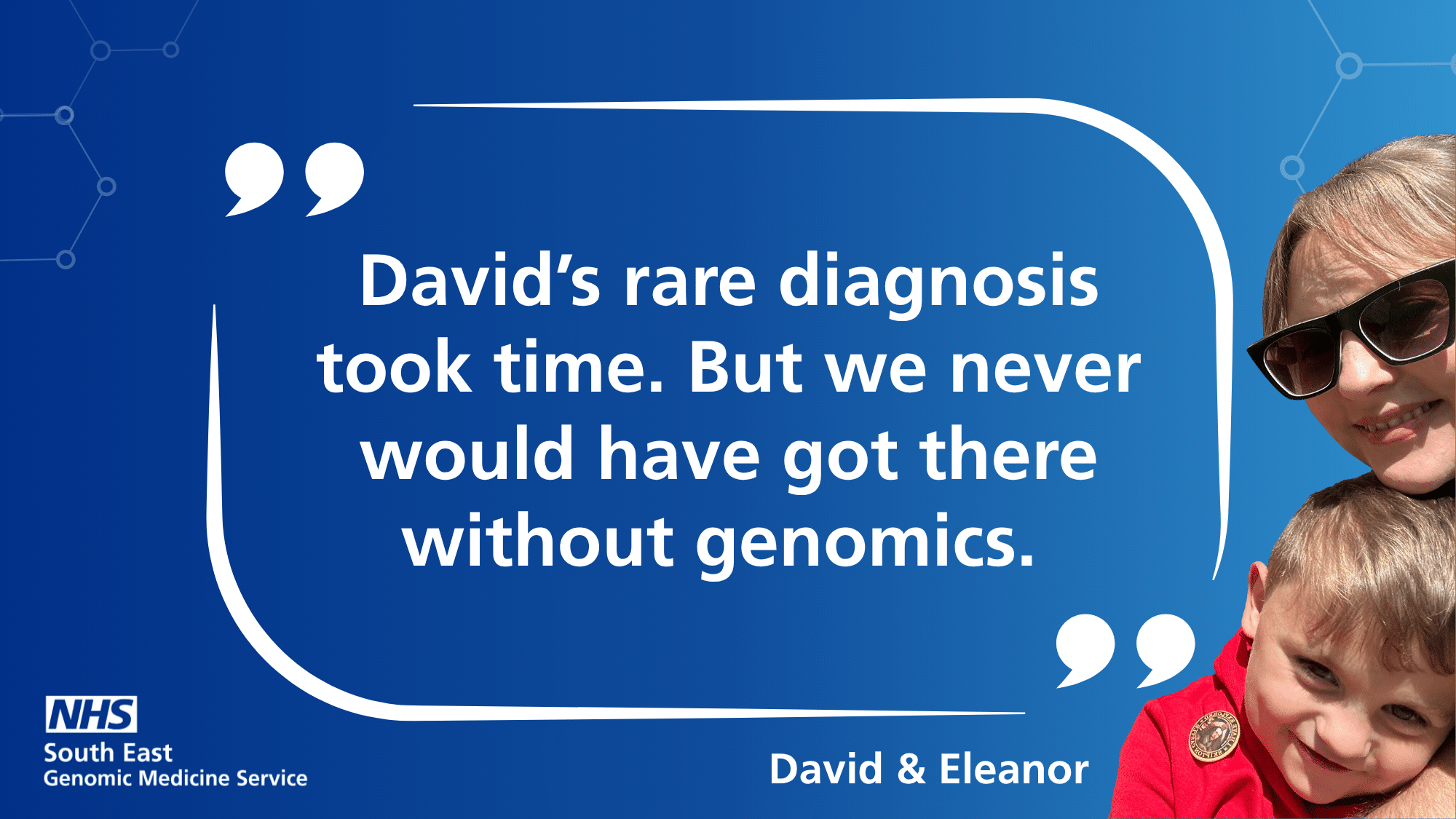My son David has a rare condition called Okur-Chung Neurodevelopmental Syndrome (OCNDS).

Meet Eleanor whose son David is one of a few hundred people in the world diagnosed with Okur-Chung Neurodevelopmental Syndrome (OCNDS).
David was born prematurely and displayed early signs of a developmental disorder, but no one at the time considered it might be genetic as David had no visible signs of a genetic condition, and no conditions were known to run in the family.
‘No one could tell me what was wrong. He seemed okay but was not really feeding, and they suspected he might have something like Down’s Syndrome but that was quickly ruled out.’
So David was eventually sent home from the neonatal unit without answers. Feeding never got any easier, and David developed severe reflux and slept poorly, leading to many sleepless nights for Eleanor and her husband.
They were concerned David was not keeping up with the usual developmental milestones. At 9 months, when David was still behind and had not yet rolled over, a visit from an NHS health visitor confirmed Eleanor’s worst fears.
‘I took him to hospital for all the standard tests, MRIs, X-rays, blood tests… All the paediatricians were so helpful, but no one could give us an answer.’
David received support from an Early Years programme, including speech and language therapy and physiotherapy, but David’s family still had no idea what was causing his symptoms. When David was two and still behind his peers, he and his family were referred for genetic testing.
‘We were so excited we were going to know what was happening to David. The Clinical Geneticist was lovely. I remember ringing her to ask her a question and spoke to her directly. They were fantastic. They cared.’
But each test came back negative. The doctors still couldn’t figure out what was wrong, and scientists still did not have enough data to identify any causes.
‘We started to lose hope. We were lucky we had such a good support network within the NHS. Families don’t understand that genetic testing doesn’t always immediately show you what’s wrong.’
Eleanor carried on with family life, living in diagnostic limbo and managing David’s care with the support of family and friends. Three years later, when David was 5, the family were in complete shock when a letter arrived with David’s genetic diagnosis.

‘We were so happy that they hadn’t forgotten about us. Even if you didn’t see them doing the work, we knew it was happening behind the scenes.’
New genomic research and discoveries meant David was finally diagnosed with a very rare genetic condition called Okur-Chung Neurodevelopmental Syndrome (OCNDS), only described for the first time in 2016. This condition is caused by a change in the CSNK2A1 gene on Chromosome 20 and, while there is no definitive cure, support is out there for families.
The family were offered genetic counselling to help them understand what was going on.
‘It was difficult finding out that David had such a rare condition that not much was known about yet.’
Eleanor was put in touch with the CSNK2A1 Foundation, a charity which were amazing with connecting them to new research and a supportive community that she meets with regularly. Though she still worries about whether David will have the chance to have a normal life and his own family, having answers and a community has helped her to remain optimistic about the future.
‘It really is a journey to diagnosis, but we were really lucky that we had support early on. It took a while, but so many parents out there might not think they need a genetic test to figure out what is going on.’
David is now 8 years old and in mainstream education with Special Educational Needs and Disabilities (SEND) support, and Eleanor is grateful to have the diagnosis as she worries what school may have been like without it. David remains happy and healthy with support from his healthcare team yet still has severe sleep issues.
One of the things that was most important to Eleanor during their diagnostic odyssey was that information on genomics, inheritance, and OCNDS were put in terms both she and the family could understand. Looking forward, she hopes that growing awareness and understanding of genetic testing for rare disease will support other families to receive faster diagnosis and personalised care.
‘If it wasn’t for the geneticist who referred us for testing, we would never have had an understanding of his condition. I hope one day that genetic conditions such as OCNDS are better recognised so other families can get the right support at the right time.’
If you have enjoyed hearing David’s story, you may also be interested in hearing more about Generation Study, a new national research programme aiming to sequence the whole genome of 100,000 newborn babies and screen them for a catalogue of over 200 conditions.